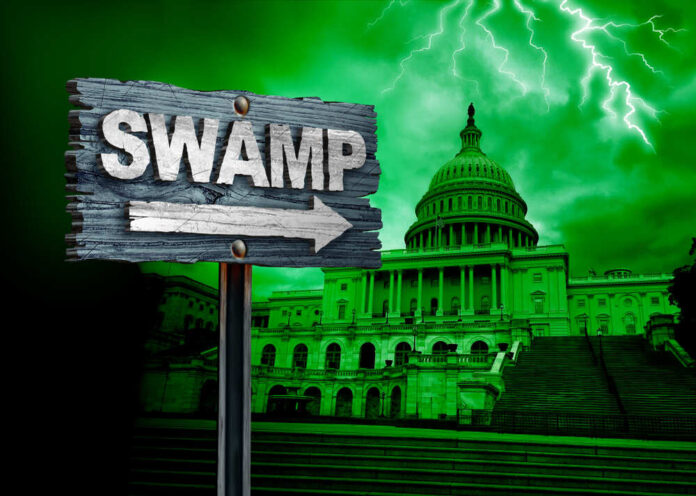
In an unexpected yet compelling collaboration, Elon Musk has thrown his weight behind Donald Trump’s audacious mission to eradicate the deep-seated corruption and vested interests within the U.S. government.
The convergence of Elon Musk and Donald Trump on a shared mission to “drain the swamp” has garnered widespread attention and controversy. Musk has expressed his eagerness to aid Trump in slashing government regulations and waste. This partnership could symbolize a significant shift toward greater transparency and efficiency in government, but it remains uncertain how it will be executed or received by various political factions and the American public.
Elon Musk, the billionaire entrepreneur known for his non-traditional methods, has extended his hand to former President Donald Trump in an effort to “drain the swamp.” According to Washington Examiner, Musk has shown interest in helping Trump reduce government regulations, a move Musk has publicly criticized as wasteful and unnecessary.
.@ElonMusk tells Trump ‘I can’t wait’ to drain the DC swamp https://t.co/WRjw2Qc5oh
— Washington Examiner (@dcexaminer) September 3, 2024
Trump is reportedly planning to ramp up his efforts to cut regulations and tackle the bureaucratic “swamp” in Washington. There are suggestions that Trump aims to establish a commission led by CEOs to identify and eliminate redundant government programs and regulations, with Musk potentially playing a significant role. Deregulation experts, like Clyde Wayne Crews from the Competitive Enterprise Institute, advocate for a prominent leader in regulatory roles to challenge the status quo.
“I can’t wait. There is a lot of waste and needless regulation in government that needs to go,” Musk said in one post on his social media platform X.
This initiative is not without its challenges and criticisms. Many argue that the Biden administration has relaxed regulatory oversight, introducing more regulations. Under Trump, the Office of Management and Budget (OMB) had a policy requiring the elimination of two regulations for every new one introduced, a policy that is no longer in effect. Crews highlighted the need for business leaders in regulatory roles to avoid initiating new entanglements and ensure the task force does not target political adversaries.
Donald Trump has talked about “Draining the Swamp.”
Do you think the “Swamp”’ actually exists in Washington D.C.?
YES or NO! pic.twitter.com/2f8Gj2FIka
— Not Elon Musk (@iamnot_elon) August 16, 2024
Musk’s investment in Twitter, purchasing it for $44 billion, also ties into his vision of cutting through waste and inefficiency. Right-leaning users are reportedly returning to Twitter, while only a small number of liberal users have left. The “Twitter Files” reveal connections between Democrat officials and Twitter’s previous administration, which has drawn significant controversy.
“Only a handful of Twitter users who have threatened to leave the social network for open-source alternative Mastodon have actually deleted their Twitter accounts,” New Scientist claimed.
The files, published by journalist Matt Taibbi, exposed how Twitter blocked the Hunter Biden laptop story under a “hacked materials policy.” Musk’s actions to buy and reform Twitter reflect his broader stance of overhauling systems bogged down by unnecessary regulations and oversight. Twitter’s workforce was overwhelmingly pro-Democrat, with 99.73% of contributions going to Democrats, further emphasizing the need for transparency and balance in social media governance.
Both Trump and Musk have expressed enthusiasm for this potential collaboration. In May, Musk denied reports of being considered for a White House advisory role. In August, Trump indicated that he would welcome Musk’s involvement in promoting “government efficiency,” and Musk was receptive to the idea. However, logistical hurdles remain, given Musk’s extensive private business interests, which could conflict with a public position.
“To be eligible for food stamps, Americans must show their gross monthly household income is below 130 percent of the poverty line. For a family of three in 2018, that means making less than $2,213 a month, for an annual income of just $26,600 a year. By contrast, farmers are able to rake in taxpayer handouts regardless of the size and profitability of their operation. The federal crop insurance program subsidizes, on average, 62 percent of farmers’ insurance premiums, with no means test whatsoever. This allows the largest farm operations to receive virtually unlimited subsidies. Owners of mega-farms have received more than $1 million in subsidies from taxpayers.” – Caroline Kitchens (R Street Institute)
Musk’s statement condemning many regulators and regulations as “needless” underscores the motivation driving this initiative. The duo aims to tackle what they view as a cumbersome regulatory framework stifling American economic and governmental efficiency. Musk’s input as an influential independent could provide the momentum Trump needs to make a meaningful impact in his regulatory reform crusade.
Will this unlikely alliance bring about the sweeping changes they promise, or will it face insurmountable opposition from entrenched interests and political foes? Only time will tell if Elon Musk and Donald Trump’s partnership to “drain the swamp” will reshape America’s regulatory landscape or become another ambitious effort lost in the bureaucratic mire.




















